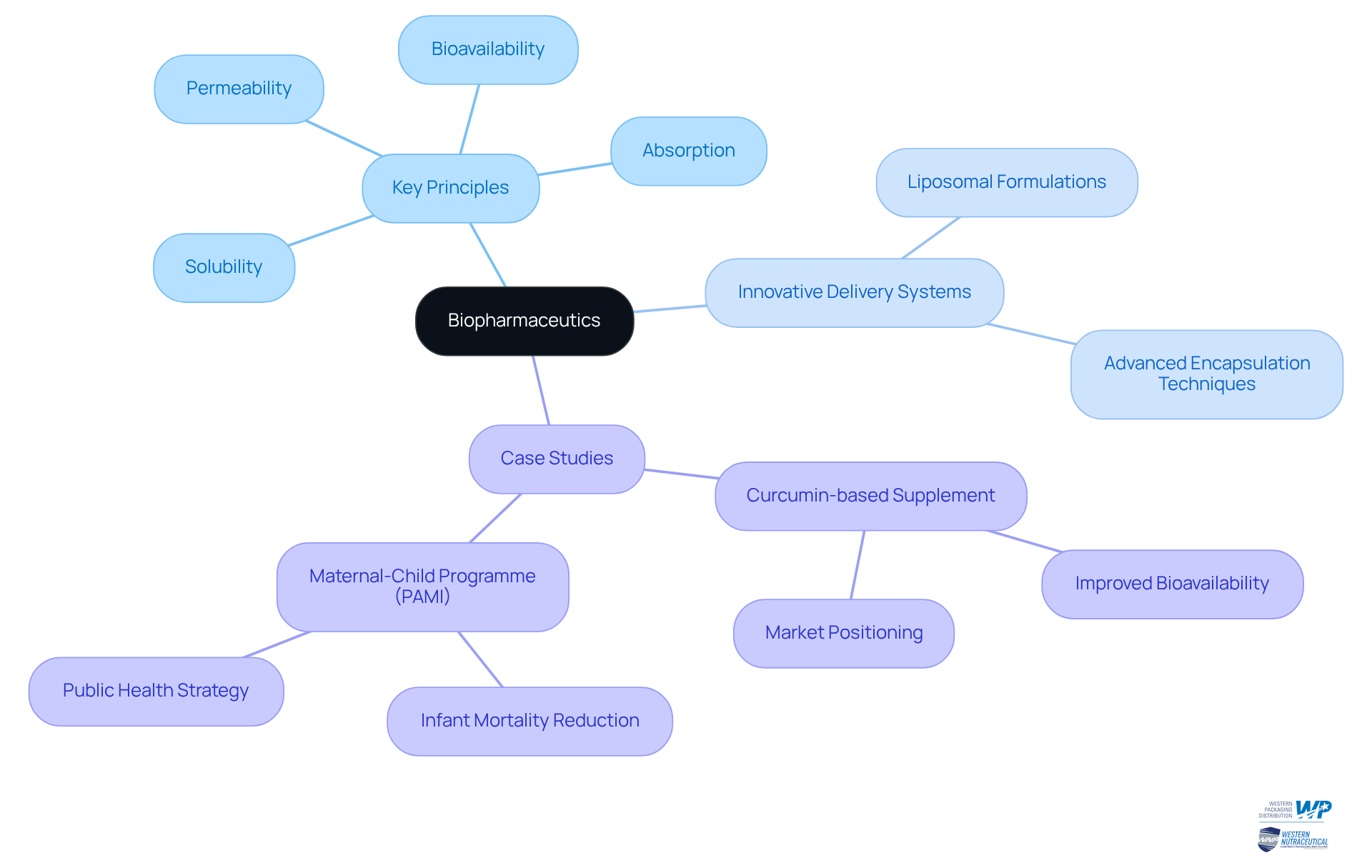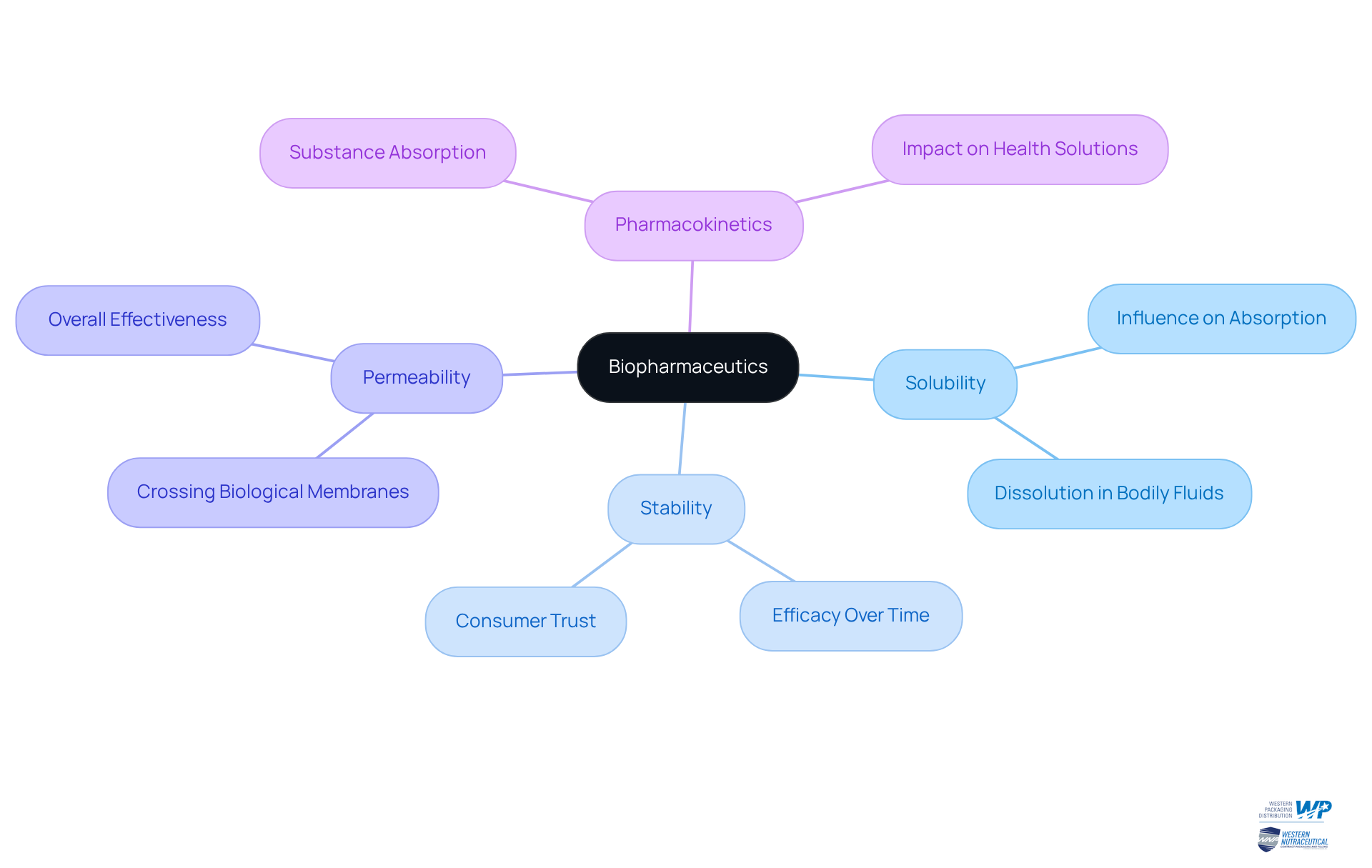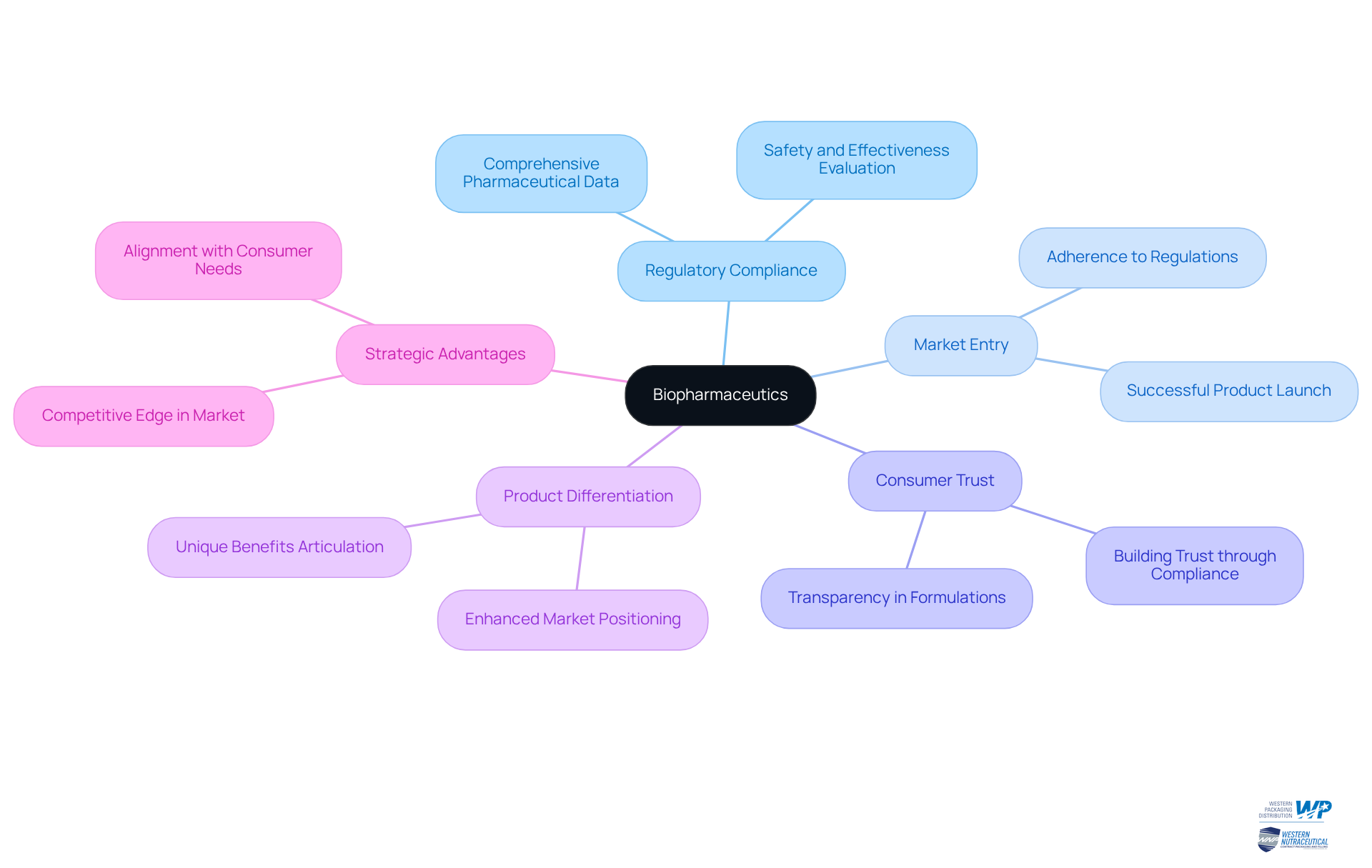Overview
Biopharmaceutics represents a specialized domain within pharmaceutical science that scrutinizes the interplay between the physical and chemical properties of drugs, their dosage forms, and administration routes, and their pharmacological effects. This understanding is pivotal for the effective delivery of therapeutic agents.
The article underscores that nutraceutical manufacturers can significantly enhance product effectiveness and safety by integrating biopharmaceutical principles, such as optimizing solubility and permeability. By doing so, they not only improve their offerings but also secure a competitive edge in the dietary supplement market.
Introduction
Understanding the intricate relationship between drug formulation and its therapeutic efficacy is vital in today's health landscape, particularly as the nutraceutical industry continues to expand. Biopharmaceutics—an essential field within pharmaceutical science—examines how the physical and chemical properties of drugs influence their effectiveness and safety. For nutraceutical manufacturers, grasping these principles is not merely beneficial; it is essential for navigating a competitive market and ensuring consumer trust.
As advancements in drug delivery systems evolve, the question arises: how can these manufacturers leverage biopharmaceutical innovations to enhance their products and meet regulatory demands?
Define Biopharmaceutics: Understanding Its Role in Modern Medicine
What is biopharmaceutics involves a specialized domain within pharmaceutical science that scrutinizes how the physical and chemical properties of a drug, alongside its dosage form and route of administration, impact its pharmacological effects. This discipline is indispensable in modern medicine, as it guarantees the effective delivery of therapeutic agents to achieve optimal health outcomes. For nutraceutical producers, a comprehensive understanding of pharmaceutical science is critical for enhancing the effectiveness and safety of their products, particularly within the fiercely competitive dietary supplement industry.
Key principles of pharmaceutical sciences encompass the solubility and permeability of active ingredients, which directly affect absorption and bioavailability. By optimizing these factors, manufacturers can significantly elevate the effectiveness of their nutraceuticals. For instance, innovative medication delivery systems, such as liposomal formulations, have demonstrated improved absorption rates, leading to enhanced therapeutic outcomes.
Case studies highlight the transformative impact of biological pharmaceuticals on drug delivery systems. A notable example is the development of a curcumin-based supplement that employed advanced encapsulation techniques to boost bioavailability. This strategy not only improved the product’s effectiveness but also positioned it advantageously in the market, illustrating the competitive edge gained through biopharmaceutical innovations.
The importance of pharmaceutical sciences in nutraceuticals is paramount. As Richard S Cooper remarked, "Cuba has achieved health status measures comparable to industrialized countries through modest infrastructure investments and a well-developed public health strategy." This insight underscores the relevance of biopharmaceutical principles, which relate to what is biopharmaceutics, in advancing health outcomes. As the industry evolves, manufacturers who prioritize biopharmaceutical principles in their development processes are likely to cultivate greater consumer trust and satisfaction, ultimately enhancing sales and market presence. By leveraging biological pharmaceuticals, nutraceutical companies can ensure their products adhere to the highest standards of efficacy and safety, thereby distinguishing themselves in a crowded marketplace.

Trace the Evolution of Biopharmaceutics: Historical Context and Development
The development of pharmaceutical sciences commenced in the early 20th century, primarily focusing on the chemical structure of medications. With advancements in technology and a deeper understanding of human biology, drug delivery systems evolved to become increasingly sophisticated. The late 20th century marked a pivotal shift with the emergence of biotechnology, facilitating the creation of biologics and biosimilars.
This historical perspective is crucial for supplement manufacturers, as it underscores the importance of integrating pharmaceutical principles into product development. Such integration not only enhances the effectiveness of offerings but also fosters greater consumer trust. Moreover, the global market for biotechnology-based products is projected to expand to at least $50 billion annually within the next decade, highlighting what is biopharmaceutics' critical role in the dietary supplement sector.
Additionally, innovations in drying methods, such as freeze-drying and superheated steam drying, are vital for preserving bioactive components, ensuring that health-related products maintain their quality and effectiveness. However, it is imperative to acknowledge the challenges associated with these drying processes; improper management can lead to the degradation of sensitive bioactive ingredients. By comprehending these dynamics, nutraceutical manufacturers can adeptly navigate the complexities of product development in a rapidly evolving market.

Examine Key Characteristics of Biopharmaceutics: Components and Functions
Understanding what is biopharmaceutics, including its key characteristics such as solubility, stability, permeability, and the pharmacokinetics of substance absorption, is critical for effective health solutions.
- Solubility directly influences how effectively a medication dissolves in bodily fluids, ensuring optimal absorption.
- Stability guarantees that the substance maintains its efficacy over time, a crucial aspect for consumer trust.
- Permeability denotes the capacity of a medication to cross biological membranes, which is essential for its absorption and overall effectiveness.
Understanding what is biopharmaceutics empowers nutraceutical producers to develop offerings that not only meet regulatory requirements but also resonate with consumers who seek reliable health solutions.

Explore the Importance of Biopharmaceutics: Implications for Drug Development and Regulation
What is biopharmaceutics, and how it plays a pivotal role not only in formulation but also within the broader context of drug development and regulatory compliance? Regulatory agencies mandate comprehensive pharmaceutical data to evaluate the safety and effectiveness of new health products.
For nutraceutical manufacturers, strict adherence to these regulations is essential for successful market entry and the cultivation of consumer trust. Moreover, understanding what biopharmaceutics entails can significantly enhance product differentiation in a saturated market, enabling companies to articulate the unique benefits of their formulations to health-conscious consumers.
This strategic approach not only fulfills regulatory expectations but also positions brands advantageously in the eyes of discerning buyers.

Conclusion
Understanding biopharmaceutics is crucial for nutraceutical manufacturers aiming to enhance product efficacy and safety in a competitive landscape. This specialized field examines the relationship between a drug's properties and its therapeutic effects, while emphasizing the significance of innovative drug delivery systems that can markedly improve absorption and bioavailability. By integrating biopharmaceutical principles into their processes, manufacturers can strategically position their products and foster consumer trust.
Key insights from the article highlight:
- The historical evolution of biopharmaceutics
- The critical characteristics impacting drug formulation
- The implications for regulatory compliance
The integration of pharmaceutical sciences, such as solubility, stability, and permeability, plays a vital role in ensuring that nutraceuticals meet both consumer expectations and regulatory standards. Case studies further illustrate how biopharmaceutical innovations can provide a competitive edge, demonstrating the necessity of staying informed about advancements in the field.
As the nutraceutical industry continues to expand, manufacturers are encouraged to prioritize biopharmaceutics in their product development strategies. By doing so, they can enhance the effectiveness and safety of their offerings while cultivating greater consumer trust and satisfaction. Embracing these principles will ultimately empower companies to thrive in a crowded marketplace, ensuring they meet the evolving demands of health-conscious consumers and regulatory bodies alike.
Frequently Asked Questions
What is biopharmaceutics?
Biopharmaceutics is a specialized domain within pharmaceutical science that examines how the physical and chemical properties of a drug, along with its dosage form and route of administration, influence its pharmacological effects.
Why is biopharmaceutics important in modern medicine?
Biopharmaceutics is essential in modern medicine because it ensures the effective delivery of therapeutic agents, which is crucial for achieving optimal health outcomes.
How do solubility and permeability affect nutraceuticals?
The solubility and permeability of active ingredients directly impact their absorption and bioavailability. Optimizing these factors can significantly enhance the effectiveness of nutraceuticals.
What are some examples of innovative medication delivery systems?
One example of an innovative medication delivery system is liposomal formulations, which have shown improved absorption rates and better therapeutic outcomes.
Can you provide a case study related to biopharmaceutics?
A notable case study is the development of a curcumin-based supplement that used advanced encapsulation techniques to enhance bioavailability, thus improving the product's effectiveness and market positioning.
What role do pharmaceutical sciences play in the nutraceutical industry?
Pharmaceutical sciences are crucial in the nutraceutical industry as they help manufacturers improve the efficacy and safety of their products, which is vital for maintaining a competitive edge.
How can biopharmaceutical principles affect consumer trust and satisfaction?
Manufacturers who prioritize biopharmaceutical principles in their development processes are likely to cultivate greater consumer trust and satisfaction, leading to enhanced sales and market presence.
What can nutraceutical companies gain from leveraging biological pharmaceuticals?
By leveraging biological pharmaceuticals, nutraceutical companies can ensure their products meet high standards of efficacy and safety, helping them stand out in a competitive marketplace.




